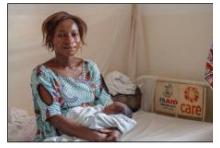Ensuring Access to Care, Prevention, and a Prepared Workforce
The Challenge. For far too many people around the world, particularly women and girls, the universal right to health remains unrealized. This is largely due to persistent economic and social inequities, the lingering impact of the COVID-19 pandemic, and the increasing number and severity of humanitarian crises. Restrictive gender norms and discrimination also exist in health systems, leading to poorer health outcomes for women and girls. Moreover, even before the COVID-19 pandemic, many health systems struggled to meet local needs, particularly for sexual and reproductive health (SRH) services. Compounding stressors have further strained these systems and put hard-won health gains at risk. Frontline community health workers (FCHWs) can help fill the gap but face many barriers, including heavy workloads, low pay, and inadequate training. Investing in health systems and the health workforce is crucial for achieving global health coverage and preparing for future pandemics.
At CARE, we work tirelessly to help vulnerable people realize their universal right to health. This means people, particularly women, have control over their bodies, access to equitable, resilient, and accountable health systems, and social, economic, and political equality. We do this through proven solutions that strengthen local health systems, including FCHWs who provide “last-mile” healthcare in hard-to-reach communities. We prioritize women and girls whose health needs are often insufficiently addressed and whose voices are often excluded from decisions affecting their health. We work with and through local partners, including health ministries, healthcare providers, and communities, to ensure the greatest reach and impact.
The Solution. Many of the world’s most daunting global health problems can be solved by addressing wealth, access, and infrastructure inequality. Through CARE’s Right to Health strategy, we seek to bring these solutions to the most marginalized people and their communities. By 2030, we aim to support 50 million people to achieve their right to health, including the sexual and reproductive health rights of 30 million women and girls. We will build resilient, equitable, and accountable health systems that can respond to shocks and crises and ensure sustainable access to quality health services for all.
Last year, CARE implemented 131 health-focused programs in 47 countries, directly impacting some 21.9 million people. Through this proposal, we seek to raise funds to deepen our work in these 47 countries and further improve health outcomes. We are nearly halfway to our ambitious 2030 impact goals but urgently need additional support to achieve them. A key to scaling up is flexible funding that can be applied where it is needed most. We invite you to contribute generously and help CARE deliver on our ambitious plans.
CARE’s Right to Health strategy focuses on four primary themes:
1. Strengthening local health systems. We know local communities are experts on their own situations, and working together is the best way to build strong, self-sufficient, and equitable health systems. To this end, CARE works with partners to ensure high-quality integrated primary health services are both available and accessible. We support more effective and motivated health workers and seek to increase health systems’ ability to serve the hardest-to-reach people. CARE is launching She Heals the World, a new global effort to ensure that FCHWs, particularly women, are adequately supported, compensated, and integrated into formal healthcare systems, thus ensuring stronger and more sustainable healthcare provision.
2. Shifting social and gender norms that are barriers to accessing health information and services. This includes addressing child, early, and forced marriage, female genital mutilation/cutting, and other harmful practices that negatively impact women’s and girls’ health outcomes. Our programs ensure that adolescents, including those facing social isolation or pregnancy, receive support. In Zambia, for example, CARE is piloting the Thanzi Langa (My Health) app, where young people can order prescription-free contraceptives and learn about SRH from trained peers, rather than family elders. The project also supports parents and caregivers to discuss traditionally sensitive/taboo subjects related to family planning.
3. Working with governments and communities to prepare and respond to health needs in emergencies. Natural disasters and conflict make it harder for women to access urgently needed maternal and SRH services. In these settings, CARE works with local partners and governments to deliver lifesaving interventions. Where possible, we strengthen existing health systems so they can respond to future shocks. We also leverage our “last-mile” reach to deliver critical services to remote areas. For example, CARE’s Fast and Fair COVID-19 response enabled 21.2 million people in 34 countries, including extremely isolated areas, to gain access to vaccines.
4. Supporting and amplifying the role of local civil society organizations to identify and lead local solutions. CARE works closely with on-the-ground partners, including community organizations and the private sector, to advocate for the right to health and to hold governments accountable. In Guatemala, for example, CARE is working in partnership with indigenous midwives to improve access to sexual and reproductive health and rights for vulnerable women.
Why CARE? CARE has decades of experience implementing health programs worldwide, with deep community roots and strong relationships with governments and health system leadership. CARE also has proven expertise in integrating humanitarian assistance and longer-term community development, which enables us to provide lifesaving services during a disaster and rebuild health systems when the crisis ends. Because of CARE’s broad scope, we can link healthcare with other program areas, such as nutrition, climate change, and water, sanitation, and hygiene, for greater impact. CARE has significant expertise in promoting gender equality and women’s and girls’ empowerment, a cornerstone of the Right to Health strategy. The strategy looks beyond singular interventions to encompass comprehensive health programming, with an emphasis on women’s health needs.
Taking Swift and Substantial Action. With your donation of flexible funds, CARE and our partners can help people worldwide, especially women and girls, exercise their right to health and empower frontline community health workers to play their vital role. This will reduce inequities in healthcare access, especially for hard-to-reach and marginalized communities. On their behalf, we thank you for considering a generous gift.
